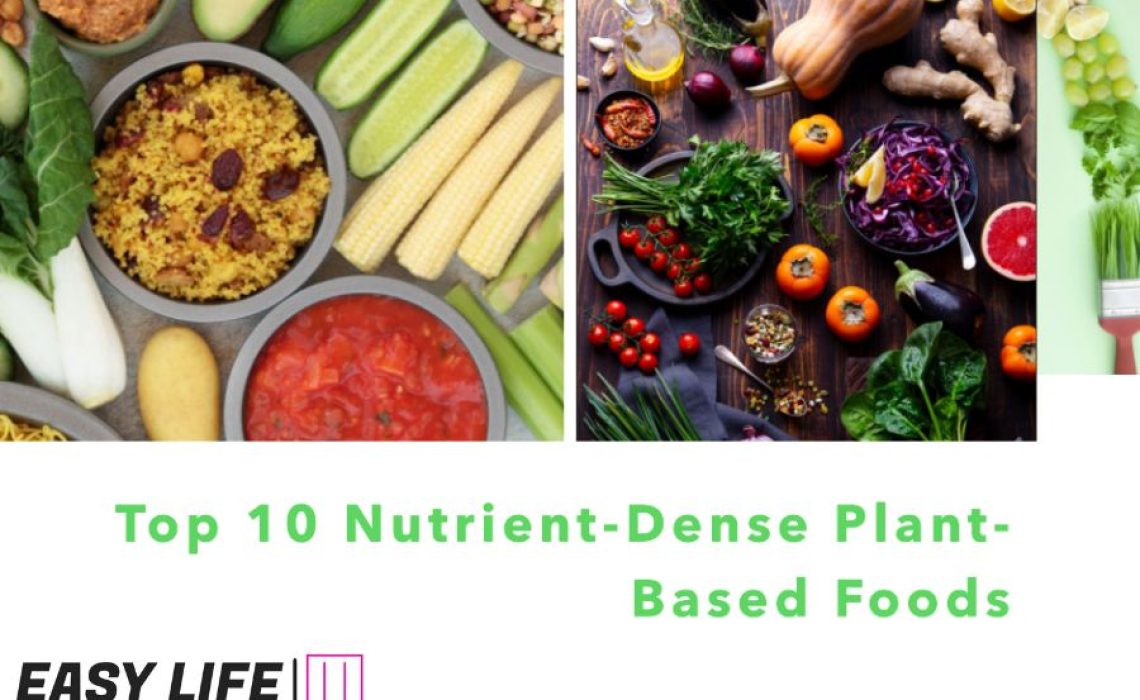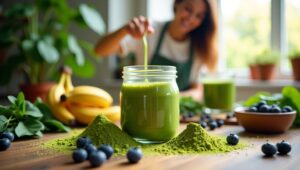If you want to switch to a plant-based diet or just eat more nutrient-dense plant-based foods, you might be thinking about which foods to focus on. This blog post will give you a list of the top 10 most nutrient-dense plant-based foods to add to your diet, as well as information about their health benefits and how to use them in your meals.
Table of Contents
ToggleList of Nutrient-Dense Plant-Based Foods
1. Leafy Greens
Spinach, kale, collard greens, and Swiss chard are just a few examples of leafy greens that rank among the highest in nutrient density. Vitamins A, C, and K, along with folate and minerals like calcium and iron, can be found in plenty. They offer protection from chronic diseases due to their high levels of antioxidants and anti-inflammatory substances.
How to Use: Blend spinach or kale for a smoothie, wrap yourself in collard greens, or sauté Swiss chard with garlic and lemon for a healthy and delicious side dish.
2. Berries
Antioxidants and fibre can be found in abundance in berries like blueberries, strawberries, raspberries, and blackberries. They are a good source of vitamin C and potassium and have few calories.
How to Use: Berries make a great addition to cereal, yoghurt, and smoothies, and they’re also delicious on their own.
3. Cruciferous Vegetables
Cruciferous veggies are full of fiber, vitamins, and minerals, like broccoli, cauliflower, Brussels sprouts, and cabbage. They also have a chemical called sulforaphane, which has been shown to help fight cancer.
How to Use: Roast broccoli and cauliflower with olive oil and spices, sauté Brussels sprouts with garlic and lemon, or make a cabbage salad with a vinegar-based sauce.
4. Legumes
Legumes, like beans, lentils, and chickpeas, are a great source of protein, fiber, and complex carbs. They also contain a lot of vitamins and minerals, such as iron, zinc, and folate.
How to Use: Make a soup with beans and vegetables, put lentils in salads or stir-fries, or make a chickpea curry.
5. Nuts and Seeds
Almonds, walnuts, chia seeds, and flax seeds are all nuts and seeds that are good sources of healthy fats, protein, and fibre. They also have a lot of vitamins and minerals, like calcium and vitamin E.
How to Use: Add nuts and seeds to your soups, oatmeal, or salads, or make your own nut butter.
6. Sweet Potatoes
Sweet potatoes are a great source of vitamins A and C, as well as complex carbs and fibre. They also have antioxidants that keep inflammation and long-term illnesses at bay.
How to Use: Bake sweet potatoes and sprinkle cinnamon and maple syrup on top, or make sweet potato chips.
7. Whole Grains
Whole grains like quinoa, brown rice, and whole wheat are a great way to get fiber, protein, and complex carbs. They also have a lot of minerals and vitamins, like iron and B vitamins.
How to Use: Make a quinoa salad with greens, use brown rice in stir-fries or bowls, or eat whole wheat bread with your meals.
8. Avocado
Avocado has a lot of good fats, fiber, and vitamins C and K. It also has antioxidants that keep inflammation and long-term illnesses at bay.
How to Use: Slice avocado and add it to salads, burgers, or tacos. You can also make guacamole.
9. Tofu and Tempeh
Tofu and tempeh are great plant-based sources of protein, and they are also full of vitamins and minerals like iron and calcium.
How to Use: Stir-fry or scramble tofu, add tempeh to sandwiches or wraps or make a veggie version of your favourite dish with tofu or tempeh as the protein source.
10. Dark Chocolate
Dark chocolate has a lot of vitamins and may help lower blood pressure and make the heart healthier. To get the most health benefits, you should choose dark chocolate with at least 70% cocoa.
How to Use: Eat a piece of dark chocolate as a dessert or snack, or add it to your smoothies or oatmeal for a delicious twist.
Conclusion of Nutrient-Dense Plant-Based Foods
By adding these nutrient-dense plant-based foods to your diet, you can get the nutrients you need and improve your health as a whole. Try adding one or two of these foods to your meals each week, and try out different recipes and cooking ways to find what works best for you. Remember that you should talk to a trained dietitian to make sure your body is getting all the nutrients it needs.










1 thought on ““The Top 10 Nutrient-Dense Plant-Based Foods to Add to Your Diet””
Pingback: Vegan Nutrition: Essential Vitamins and Minerals